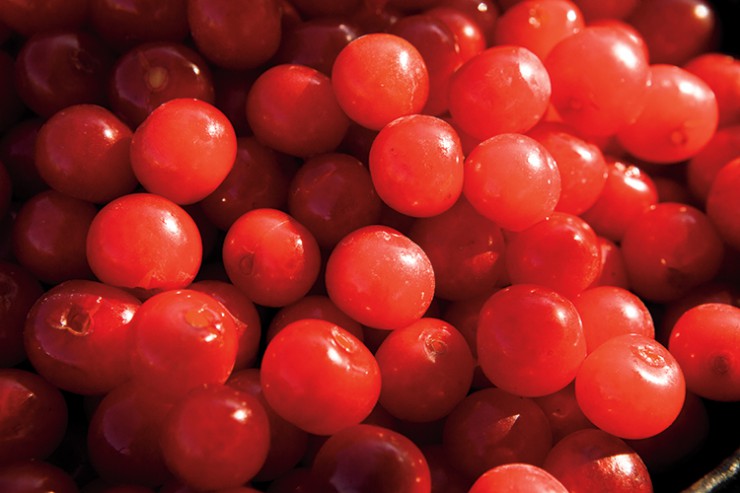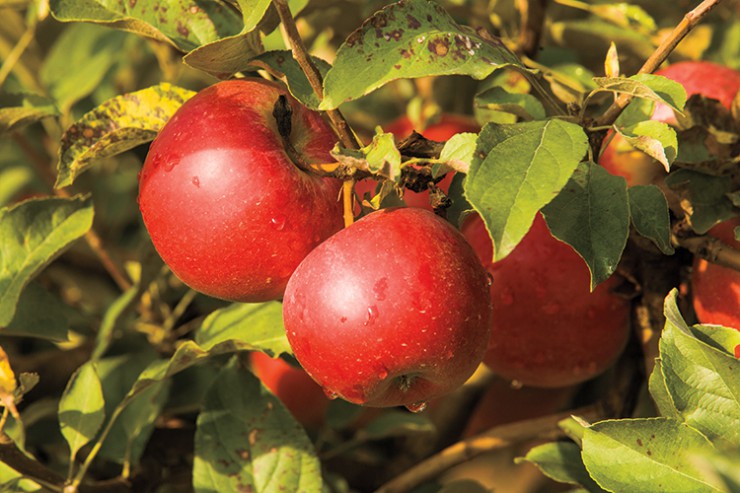Home > Michigan > Michigan Farm to Table > Michigan Fruit: Pickin’ Progress
Michigan Fruit: Pickin’ Progress
In partnership with: Michigan Department of Agriculture & Rural Development

Apples, blueberries, cherries – this varied list of fruits has one thing in common. They’re known as super foods, packed with disease-fighting antioxidants, vitamins and other health benefits.
Michigan cherry growers like Don Gregory, who operates Cherry Bay Orchards in Suttons Bay with his brother Bob, son-in-law and nephew, are trying to get the small red fruit added to the superfood list. Historically, tart cherries have been popular in desserts, but research shows that cherries contain antioxidants that help reduce pain from arthritis, gout and headaches, making them beneficial for much more than just pie.
“We’re trying to reinvent our tart cherries as a hot new superfruit,” says Phil Korson, president of the Cherry Marketing Institute. “It’s been an exciting time for us.”
Sales of dried cherries and cherry juice concentrate have accelerated as consumers learn more about the science that supports cherries and their new superfruit status.
Michigan’s lake-effect climate places it among the nation’s major fruit-growing states. The state ranks No. 1 in the production of tart cherries, producing 75 percent of the U.S. supply, according to the National Agricultural Statistics Service. The state ranks fourth in sweet cherries.
About 540 cherry farms operate in Michigan as of 2013. The state’s fruit industry remains deeply rooted in experience with its family-owned farms, like High Acres Fruit Farm in Hartford.
“I think it’s an exciting time to be in fruit and vegetable production,” says Trever Meachum, who operates High Acres Fruit Farm with his father and two brothers. “I think people are more in tune with being healthy and conscious eaters.”
The families of Cherry Bay Orchards can relate. They added a drying and juice-making operation to their farm in the last 10 years.
“That’s the fastest-growing part of our market today, and it’s all related to the health benefits of tart cherries,” Gregory says.
Montmorency cherries dominate the tart cherry industry in Michigan and throughout the country. Today, the U.S. is the largest producer of this superfruit in the world, Korson says.

Michigan’s Apple Growers
Favorite apple varieties include Honeycrisp, Jonagold, Gala and Fuji, according to the Michigan Apple Committee.
Additionally, Michigan’s large bumper crop and commitment to distributing Michigan apples to 26 states and 18 countries left apple shippers busier than ever.
In fact, the Michigan apple industry set new shipment records two weeks in a row in October 2013, shipping 411,973 boxes of apples the week of Oct. 5, and 414,702 boxes of apples the week of Oct. 12.
“Michigan’s agriculture and apple industry are very significant to Michigan’s economy,” says Mike Rothwell, president and general manager at BelleHarvest Sales, Inc. “At BelleHarvest, one of the largest fresh apple marketers in the eastern U.S., we market a product that we are really excited about. We have a tremendous impact on a lot of people’s lives, whether it’s the people we employ, the growers we serve, or the customers we provide for. As far as economic activity, we are approaching close to a billion dollars based on the Michigan apple industry alone.”
Michigan — the nation’s third-largest producer of apples — produces on average more than 800 million pounds of apples per year. Sixty percent of those apples are processed for foods such as applesauce, pie filling, apple cider and apple juice. Likewise, Michigan slices more apples than any other state for use in pies and fresh-cut slices.
“If you look at production and utilization figures, processing is at least half of that. Processing is still a big sector of the apple industry,” says Eric MacLeod, processor for Cherry Growers, Inc. “Right here in Michigan we are growing a lot of apples compared to two years ago. We feel partial that processing is a big contribution to the state’s apple industry and the economy. We have a growing apple industry, and production in the future certainly has the ability to be greater than what it has been over the last few years with new plantings and new planting systems. Moving forward, apples and processing will take on a great role in contributing to our economy.”



